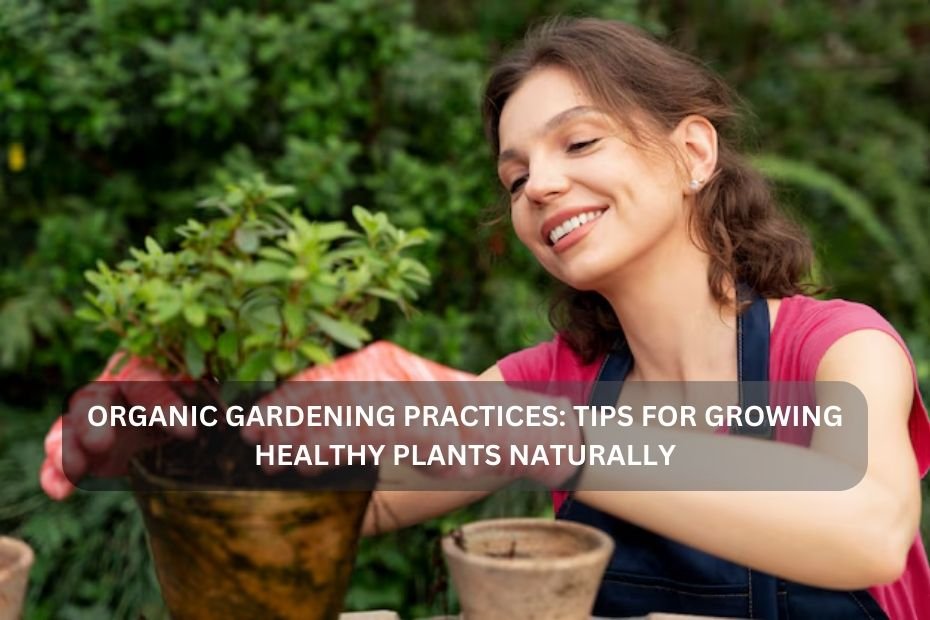Organic gardening is a delightful way to grow your own fruits, vegetables, and flowers without relying on synthetic chemicals or pesticides. It’s not just a trend; it’s a lifestyle choice that promotes sustainability, environmental health, and personal well-being. Whether you’re a seasoned gardener or a beginner with a green thumb, there are numerous organic gardening practices you can adopt to cultivate healthy plants naturally. Let’s dig into some practical tips and techniques that can help you grow a thriving organic garden.
What is Organic Gardening?
Before we dive into the tips, let’s briefly discuss what organic gardening entails. Organic gardening focuses on working with nature rather than against it. This means using natural methods to nurture your plants, manage pests, and enrich the soil. Organic gardeners avoid synthetic fertilizers and pesticides, instead opting for natural alternatives that enhance plant growth while protecting the ecosystem.
1. Start with Healthy Soil
The foundation of any healthy garden is the soil. Rich, well-aerated soil provides the nutrients plants need to thrive. Here are some steps to create healthy soil for your organic garden:
Test Your Soil
Before planting, test your soil to understand its nutrient content and pH level. You can purchase soil testing kits from garden centers or send samples to a local cooperative extension. Knowing your soil’s composition will help you determine what amendments it may need.
Add Organic Matter
Incorporate organic matter like compost, aged manure, or leaf mold into your soil. These materials improve soil structure, enhance moisture retention, and supply essential nutrients. Aim for at least 25% organic matter in your soil for optimal health.
Practice Crop Rotation
Rotating crops helps prevent soil depletion and reduces pest and disease problems. Plan your garden layout so that different plant families are grown in different areas each season. For instance, follow heavy feeders like tomatoes with nitrogen-fixing plants like beans.
2. Choose Native and Adapted Plants
Selecting the right plants for your garden is crucial for success. Native plants are adapted to your local climate and soil conditions, making them easier to grow and maintain. They are also more resistant to local pests and diseases.
Research Local Flora
Take some time to research native plants that thrive in your area. Many local extension services and native plant societies can provide information on suitable varieties. By choosing these plants, you’ll create a garden that is both beautiful and beneficial to local wildlife.
Opt for Heirloom Varieties
Consider planting heirloom seeds, which are traditional varieties passed down through generations. These plants often have better flavor and are more resilient than hybrid varieties. Plus, growing heirlooms helps preserve biodiversity in our food systems.
3. Water Wisely
Watering is a critical aspect of organic gardening. How and when you water can significantly impact plant health. Here are some watering tips:
Use Drip Irrigation
Drip irrigation systems deliver water directly to the plant roots, minimizing waste and evaporation. This method helps ensure that your plants receive the right amount of moisture without over-saturating the soil.
Water Early or Late
Water your garden early in the morning or late in the afternoon to minimize evaporation. During the heat of the day, water can quickly evaporate before reaching the roots, wasting valuable resources.
Mulch to Retain Moisture
Applying a layer of organic mulch, such as straw, wood chips, or shredded leaves, around your plants helps retain soil moisture. Mulch also suppresses weeds, improves soil health, and adds organic matter as it breaks down.
4. Manage Pests Naturally
Pests can be a significant challenge for any gardener, but organic methods can help keep them in check without harming beneficial insects. Here are some natural pest management strategies:
Encourage Beneficial Insects
Attract beneficial insects, such as ladybugs and lacewings, to your garden. These insects feed on pests like aphids and caterpillars. You can attract them by planting flowers like marigolds, yarrow, and dill.
Use Companion Planting
Certain plants can help repel pests or attract beneficial insects when planted together. For example, planting basil near tomatoes can deter tomato hornworms, while marigolds can repel nematodes and other pests.
Create Homemade Pest Solutions
If pests do become a problem, you can create simple, natural pest control solutions. For instance, a mixture of water, soap, and garlic can deter aphids. Just be sure to test any solution on a small area first to avoid damaging your plants.
5. Fertilize Organically
Providing nutrients to your plants is essential for growth, but it’s crucial to do so organically. Here are some organic fertilization methods:
Composting
Create your own compost by collecting kitchen scraps, yard waste, and other organic materials. Composting not only enriches your soil but also reduces waste. Add compost to your garden beds at least once a season to provide a slow-release source of nutrients.
Use Organic Fertilizers
If your plants need an extra nutrient boost, consider using organic fertilizers like fish emulsion, bone meal, or kelp extract. These fertilizers provide essential nutrients without the harmful side effects of synthetic options.
Apply Mulch with Nutrients
Organic mulches, such as grass clippings or wood chips, can break down over time and release nutrients back into the soil. This method of fertilization supports plant health while improving soil structure.
6. Practice Weed Control
Weeds can compete with your plants for nutrients and water, so it’s essential to manage them effectively. Here are some organic weed control methods:
Hand Pulling
Regularly inspect your garden for weeds and pull them by hand, ensuring you remove the entire root. This method can be time-consuming but is effective, especially in smaller gardens.
Use Landscape Fabric
In areas where you don’t want weeds, consider using landscape fabric. This allows water and air to penetrate while preventing weed growth. Just be sure to cover it with mulch to enhance its effectiveness and aesthetics.
Smother Weeds with Mulch
Applying a thick layer of mulch not only retains moisture but also suppresses weed growth. Organic mulches can be effective at blocking sunlight and preventing weed seeds from germinating.
7. Create a Biodiverse Garden
Biodiversity is crucial for a healthy garden ecosystem. A diverse garden can reduce pests, improve soil health, and create habitats for wildlife. Here’s how to promote biodiversity:
Plant a Variety of Species
Instead of planting just one type of crop, include a mix of plants in your garden. This diversity can help attract various beneficial insects and create a more balanced ecosystem.
Incorporate Perennials
Perennial plants come back year after year, providing stability and reducing the need for replanting. They can also improve soil health and attract pollinators.
Create Habitat for Wildlife
Consider adding birdhouses, bat boxes, or insect hotels to your garden. These structures provide shelter for wildlife, which can help control pests and pollinate your plants.
8. Educate Yourself Continually
The world of organic gardening is ever-evolving, with new techniques and discoveries being made all the time. Stay informed and continue learning about organic practices through various resources:
Read Books and Magazines
There are countless books and magazines dedicated to organic gardening. These resources can provide valuable information and inspiration for your gardening journey.
Join Local Gardening Clubs
Connecting with fellow gardeners can offer support, share knowledge, and foster a sense of community. Local gardening clubs often host workshops and events, making them great places to learn.
Attend Workshops and Seminars
Look for workshops, seminars, and community events focused on organic gardening. These hands-on experiences can help you develop new skills and techniques.
Conclusion
Organic gardening is a rewarding journey that allows you to cultivate healthy plants while nurturing the environment. By focusing on healthy soil, choosing the right plants, managing pests naturally, and promoting biodiversity, you can create a thriving garden that benefits both you and the planet. Remember, every gardener’s journey is unique, so be patient and enjoy the process of growing your own organic paradise. With these tips and practices, you’ll be well on your way to becoming a successful organic gardener. Happy gardening!

